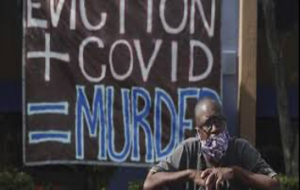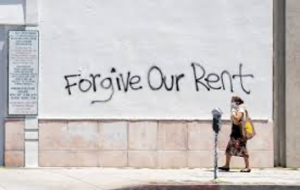 In just a little over six months, the world as we know it has drastically changed due to COVID-19, which presents a threat to public health. Countries are currently at a standstill due to efforts in trying to stop the spread of an invisible virus that has no known cure. Hospitals and healthcare workers have exhausted their resources in an effort to fight off a virus that has no vaccine. Not only have schools and jobs shut down, but travel restrictions have been enforced and all sports and live entertainment has been cancelled. As of October 7, 2020, there has been approximately 7,475,262 cases of infected citizens in the United States alone, a number that will continue to rise. A “new normal” has emerged and it consists of wearing face masks, carrying hand sanitizers, and practicing social distancing of at least six feet apart from other people. Communications are now done through an online platform called Zoom. Human connection and interaction temporarily seized. But how about human empathy?
In just a little over six months, the world as we know it has drastically changed due to COVID-19, which presents a threat to public health. Countries are currently at a standstill due to efforts in trying to stop the spread of an invisible virus that has no known cure. Hospitals and healthcare workers have exhausted their resources in an effort to fight off a virus that has no vaccine. Not only have schools and jobs shut down, but travel restrictions have been enforced and all sports and live entertainment has been cancelled. As of October 7, 2020, there has been approximately 7,475,262 cases of infected citizens in the United States alone, a number that will continue to rise. A “new normal” has emerged and it consists of wearing face masks, carrying hand sanitizers, and practicing social distancing of at least six feet apart from other people. Communications are now done through an online platform called Zoom. Human connection and interaction temporarily seized. But how about human empathy?
The COVID-19 pandemic has caused the economic system to plummet expeditiously. Because of the pandemic, millions of people have lost their employment. Loss of employment calls for a loss of income. Consequently, bills cannot be paid. For most, housing is the most important expense. Failing to pay for your rent or mortgage could result in foreclosure or eviction. Having a roof over your head is a basic necessity. A home provides us with privacy, shelter, and identity. But most of all, having a home provides us with security and safety. Being evicted during the COVID-19 pandemic is a death sentence. Evictions do not solve anything. In fact, it creates more problems than solutions. Evictions help spread the virus. Now homeless, people have no choice but to stay in overcrowding shelters or tight spaces with relatives; are exposed to unsanitary conditions, and are at risk of employment that does not provide adequate safety measures from COVID-19. A sense of hopelessness, powerlessness, and stress consumes you. You have nowhere to go. You feel unsafe. How do you take care of yourself and your family out on the streets during a pandemic? What happens now?
 Fortunately, some relief was extended following a federal eviction moratorium issued by the Centers for Disease Control and Prevention (CDC) that took effect on September 4, 2020. This temporary moratorium temporarily halts evictions through the end of December 31, 2020. This moratorium’s primary goal is to help slow the spread of COVID-19 while also protecting millions of individuals from eviction for non-payment. This moratorium has specific eligibility requirements that must be met in order to qualify. The moratorium is not automatic, individuals interested must fill out a form and return it to the landlord. This moratorium, however, does not stop all evictions. Evictions may still continue under certain circumstances, such as violating a building code or contractual obligation, other than the timely payment of rent.
Fortunately, some relief was extended following a federal eviction moratorium issued by the Centers for Disease Control and Prevention (CDC) that took effect on September 4, 2020. This temporary moratorium temporarily halts evictions through the end of December 31, 2020. This moratorium’s primary goal is to help slow the spread of COVID-19 while also protecting millions of individuals from eviction for non-payment. This moratorium has specific eligibility requirements that must be met in order to qualify. The moratorium is not automatic, individuals interested must fill out a form and return it to the landlord. This moratorium, however, does not stop all evictions. Evictions may still continue under certain circumstances, such as violating a building code or contractual obligation, other than the timely payment of rent.
Florida Governor Ron DeSantis also extended an administrative order halting evictions through the end of the month of September due to COVID-19 related issues. The Florida eviction moratorium has been in place since late April. Both of these orders do not forgive rent—the individual still has an obligation to pay accrued rent or mortgage payments, as well as any late payment fees. These orders simply delay evictions, it does not prevent evictions or give individuals financial relief. Gov. DeSantis announced that Florida will be moving into Phase 3 of reopening starting on Friday, October 2, 2020. Phase 3 means that most social distancing guidelines will be lifted. Most places of businesses will be open at full capacity. With Florida now in Phase 3, what happens now with the temporary halt of evictions? On September 30, 2020, Gov. DeSantis announced that he would be allowing the Florida eviction moratorium to expire. Fortunately, renters are still protected under the CDC eviction order, which expire on December 31, 2020. This is great news for those that have not been fortunate in keeping or finding a job during the pandemic. Just because Phase 3 will begin on Friday, does not necessarily mean that jobs are automatically available. The eviction orders are necessary in order to stop the spread of COVID-19 and decrease the related number of deaths. We need to work together to overcome COVID-19. The Government must, “forgive our rent.”
With Florida now in Phase 3, what happens now with the temporary halt of evictions? On September 30, 2020, Gov. DeSantis announced that he would be allowing the Florida eviction moratorium to expire. Fortunately, renters are still protected under the CDC eviction order, which expire on December 31, 2020. This is great news for those that have not been fortunate in keeping or finding a job during the pandemic. Just because Phase 3 will begin on Friday, does not necessarily mean that jobs are automatically available. The eviction orders are necessary in order to stop the spread of COVID-19 and decrease the related number of deaths. We need to work together to overcome COVID-19. The Government must, “forgive our rent.”



 In just a little over six months, the world as we know it has drastically changed due to COVID-19, which presents a threat to public health. Countries are currently at a standstill due to efforts in trying to stop the spread of an invisible virus that has no known cure. Hospitals and healthcare workers have exhausted their resources in an effort to fight off a virus that has no vaccine. Not only have schools and jobs shut down, but travel restrictions have been enforced and all sports and live entertainment has been cancelled. As of October 7, 2020, there has been approximately 7,475,262 cases of infected citizens in the
In just a little over six months, the world as we know it has drastically changed due to COVID-19, which presents a threat to public health. Countries are currently at a standstill due to efforts in trying to stop the spread of an invisible virus that has no known cure. Hospitals and healthcare workers have exhausted their resources in an effort to fight off a virus that has no vaccine. Not only have schools and jobs shut down, but travel restrictions have been enforced and all sports and live entertainment has been cancelled. As of October 7, 2020, there has been approximately 7,475,262 cases of infected citizens in the  Fortunately, some relief was extended following a federal eviction moratorium issued by the
Fortunately, some relief was extended following a federal eviction moratorium issued by the  With Florida now in Phase 3, what happens now with the temporary halt of evictions? On September 30, 2020, Gov. DeSantis announced that he would be allowing the Florida eviction moratorium to expire. Fortunately, renters are still protected under the CDC eviction order, which expire on December 31, 2020. This is great news for those that have not been fortunate in keeping or finding a job during the pandemic. Just because Phase 3 will begin on Friday, does not necessarily mean that jobs are automatically available. The eviction orders are necessary in order to stop the spread of COVID-19 and decrease the related number of deaths. We need to work together to overcome COVID-19. The Government must, “forgive our rent.”
With Florida now in Phase 3, what happens now with the temporary halt of evictions? On September 30, 2020, Gov. DeSantis announced that he would be allowing the Florida eviction moratorium to expire. Fortunately, renters are still protected under the CDC eviction order, which expire on December 31, 2020. This is great news for those that have not been fortunate in keeping or finding a job during the pandemic. Just because Phase 3 will begin on Friday, does not necessarily mean that jobs are automatically available. The eviction orders are necessary in order to stop the spread of COVID-19 and decrease the related number of deaths. We need to work together to overcome COVID-19. The Government must, “forgive our rent.”